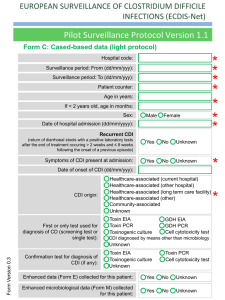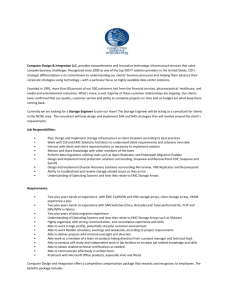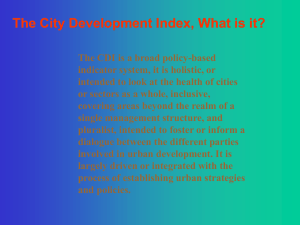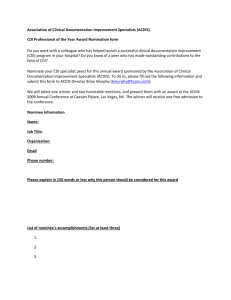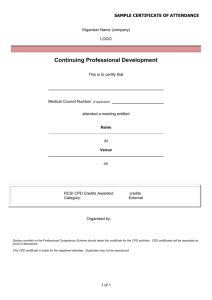Continuous Professional Development
advertisement
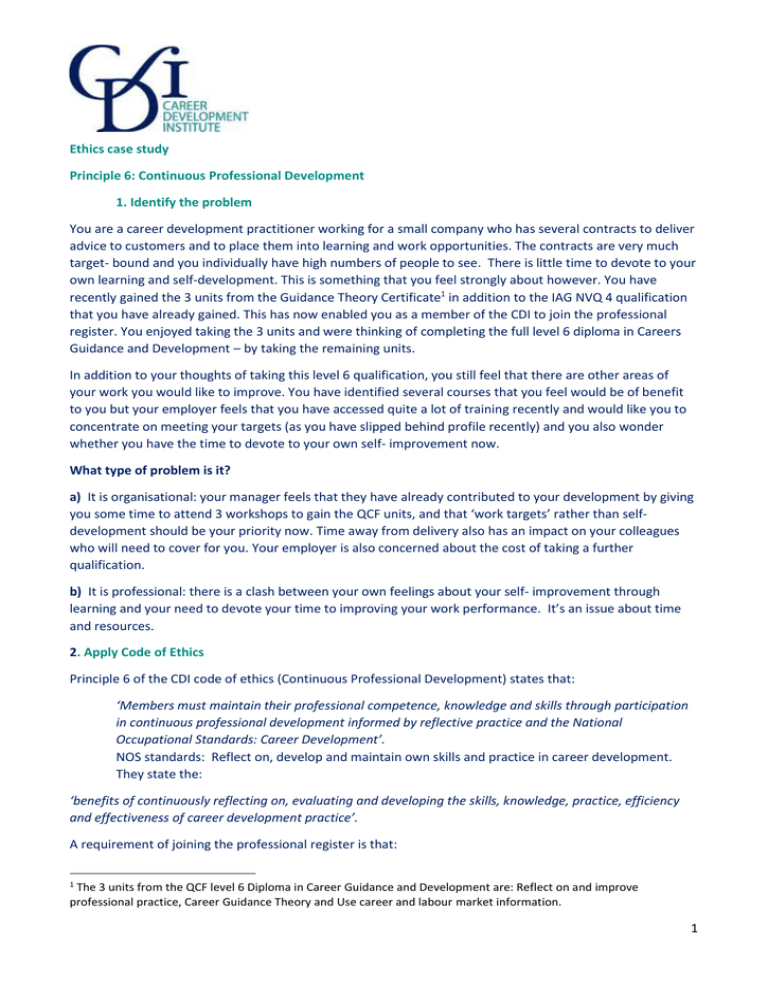
Ethics case study Principle 6: Continuous Professional Development 1. Identify the problem You are a career development practitioner working for a small company who has several contracts to deliver advice to customers and to place them into learning and work opportunities. The contracts are very much target- bound and you individually have high numbers of people to see. There is little time to devote to your own learning and self-development. This is something that you feel strongly about however. You have recently gained the 3 units from the Guidance Theory Certificate1 in addition to the IAG NVQ 4 qualification that you have already gained. This has now enabled you as a member of the CDI to join the professional register. You enjoyed taking the 3 units and were thinking of completing the full level 6 diploma in Careers Guidance and Development – by taking the remaining units. In addition to your thoughts of taking this level 6 qualification, you still feel that there are other areas of your work you would like to improve. You have identified several courses that you feel would be of benefit to you but your employer feels that you have accessed quite a lot of training recently and would like you to concentrate on meeting your targets (as you have slipped behind profile recently) and you also wonder whether you have the time to devote to your own self- improvement now. What type of problem is it? a) It is organisational: your manager feels that they have already contributed to your development by giving you some time to attend 3 workshops to gain the QCF units, and that ‘work targets’ rather than selfdevelopment should be your priority now. Time away from delivery also has an impact on your colleagues who will need to cover for you. Your employer is also concerned about the cost of taking a further qualification. b) It is professional: there is a clash between your own feelings about your self- improvement through learning and your need to devote your time to improving your work performance. It’s an issue about time and resources. 2. Apply Code of Ethics Principle 6 of the CDI code of ethics (Continuous Professional Development) states that: ‘Members must maintain their professional competence, knowledge and skills through participation in continuous professional development informed by reflective practice and the National Occupational Standards: Career Development’. NOS standards: Reflect on, develop and maintain own skills and practice in career development. They state the: ‘benefits of continuously reflecting on, evaluating and developing the skills, knowledge, practice, efficiency and effectiveness of career development practice’. A requirement of joining the professional register is that: 1 The 3 units from the QCF level 6 Diploma in Career Guidance and Development are: Reflect on and improve professional practice, Career Guidance Theory and Use career and labour market information. 1 ‘Confirmation that your skills and knowledge are up to date through your undertaking, reflecting on and recording of 25 hours of CPD per year’. 3. Review of professional literature A review of existing websites such as the current CDI and National Guidance Research Forum websites will give you encouragement and motivation to look at different ways of improving your own development. CDI have recently produced a Resource Guide for Employers on using the National Occupational Standards: Career Development, and a brochure explaining the ‘benefits of being on the professional register and the value of CPD’ which you might like to read yourself as well as discussing with your employer. In the member’s section of the CDI website it is suggests how those 25 hours of learning and development might be spent to good effect. There are many ways that time can be spent in improving your performance that don’t always entail attending training away from the workplace. The recent embers’ only CPD Resources section is also a good source of CPD. As you have taken unit 2 ‘Reflect on and improve professional practice’ from the level 6 Career Guidance & Development Diploma you should be well aware of the different types of approach you might take in looking at your own reflective practice. For example, Schon’s The Reflective Practitioner 1983, Gibbs ‘Learning by Doing’ 1988, Brookfield ‘Critically Reflective Practice’ 1998. You will already have lists of references of other theorists. 1. 4. Consult with experienced professional colleagues and/or supervisors and/or relevant professional body Firstly, you really need to discuss your training needs directly with your line manager. If you have a staff appraisal with your line manager you should use this to express your concerns. Gaps in your knowledge and experience should be identified by your manager during the discussion with suggestions around finding a way to address them. For example, if your manager says that you need to meet your targets on a regular basis – the solution might be to work shadow others that do. Improving your knowledge of external organisations may be a way of working more efficiently with your customers in referral and signposting. This might entail visits to external organisations. Attending a time management course may be an option. It would be helpful to prioritise your development needs. You need to discuss - what is required to effectively perform the role and what would be ‘nice to have’. If your manager feels that your performance is extremely high and cannot be improved, you could suggest gaps in your knowledge that you yourself have identified and would like to improve. If someone has recently observed your interviews with customers there may have been some suggestions on how you might improve. Secondly, rather than waiting for a staff appraisal ask to see your manager to discuss ways that you might improve rather than going ‘head on’ to ask to attend a course. There may be alternative ways of ‘upskilling’ as mentioned above. If you worked in a larger organisation you may have an HR dept. where you might also enquire about CPD support. You might also talk to work colleagues about any training that they think might be useful. You might also approach your course assessors/tutors from your level 6 course for useful follow up training. If you wish to talk about the remaining level 6 units you will gain much more information about costs and time needed to complete. You could go on-line to join a professional forum – such as on Linked-in and contact colleagues on the CDI website. 2 5. Potential courses of action. Identify your own development needs. You might like to keep a reflective practice diary of your day to day work practice to look at ways you think you might improve. Ask work colleagues, managers, supervisors, assessors about ways they think you might improve. 360 degree feedback is often a brave but effective way to go forward! Look at the best ways to address your needs. It may not always involve training courses away from the workplace. For example, various ways of achieving the 25 hours CPD are suggested on the A to Z of CPD on the member’s section of the CDI website: Attending a full day CPD event Reading articles in the NICEC journal Watching a podcast Taking part in a webinar An ethical dilemma case study Researching information for a session you are delivering Reading CDI news by email and following up some of the links to further information Attending a networking event Researching and writing an article for a journal Researching a discussion topic to share with colleagues. If you really wish to complete the full level 6 diploma – you will need to gain further information about time and cost implications before going forward. You could check with your employer if there is a possibility of a compromise on time and costs – for example, would they pay for half the training costs? The implication for you will be - can I pay for this? Would I be prepared to do it in my own time with the minimum of workplace involvement e.g. Observation in the workplace? 6. Select the most appropriate course of action You may wish to delay your decision to take the further units. You have already gained 18 credits towards the 60 needed for the full qualification and there is no immediate need to continue at this stage. You are on the CDI professional register and you can ‘bank’ the 3 units until you have the opportunity to study later. You choose to reflect on your current performance and look at ways to address the gaps so that in the short term you can provide a better service to your customers. For example, you know that you don’t feel confident about working with groups of customers and your manager agrees that you need support on this. She suggests that you could work shadow colleagues who are successfully working with groups. On doing so, you get involved in researching and designing some specific material on labour market information that can be used by yourself and colleagues in future sessions. You have found a CDI webinar coming up about group work that you could join in the comfort of your own office and that will not detract from delivery time. You are also approaching your previous assessor for any reading material on working effectively with groups. You enjoy networking with others and have found a 1 day course run by the CDI on this subject and feel more confident in asking your employer to attend a ‘one off’ workshop. 7. Evaluate the selected course of action The test of justice: You satisfy your needs for self- improvement and the requirements of your professional status on the register. All your aspirations can be addressed – but in a variety of ways. 3 The test of accountability: You would be happy to publicise your actions as you feel your professional integrity is maintained whilst working closely with your team and your company to achieve success. The test of universality: You would be happy to recommend your course of action to others as you think it will raise awareness with fellow professionals of how you can improve your professional development whilst balancing your own goals and targets in the workplace. 8. Implement the course of action You have approached your assessor/trainer about the idea of taking the full level 6 qualification at a later date and she explains to you that this is a flexible qualification and there would be the opportunity to start later if you wish. She helpfully provides you with a variety of material around preparing an effective group work session for your immediate needs. You have also found another training provider that would cost less and involve more private study time and less time away from the workplace. You pursue your training needs in improving your group work skills at work. Your manager is keen to help and organises time for you to observe a colleague delivering group sessions. Unexpectedly, you become involved in researching labour market information and preparing material for use for yourself and colleagues in future group work sessions. You tell your manager about a webinar organised by the CDI on delivering group sessions, it doesn’t come out of company time and she is happy for you to participate. There is also a 1 day workshop coming up at a future date and your employer is considering putting you forward for this as you have shown such enthusiasm to improve your workplace performance. In total, you have been surprised to find that the total number of hours spent on improving your group work skills has totalled 17 hours! This included 3 hours work shadowing, 3 hours researching LMI, 2 hours reading group work effectiveness material, a 2 hour webinar and attending a 7 hour day workshop. 9. Monitor and evaluate outcome What lessons emerged? You have learned new ways of evaluating your performance to address any gaps in competence. You have learned about the variety of ways you can improve your CPD. You feel very satisfied to know that 17 hours out of the 25 hour requirement from the CDI register have been successfully achieved. You now have the enthusiasm to continue to improve your own self development. You now know more about how to read widely and research topics. You have also learned how to negotiate effectively with your manager to achieve some success in improving your CPD (which has been an ethical issue for you) whilst showing her how this can be of benefit to the company. You have also gained her appreciation of your enthusiasm to improve your performance in the workplace. You have also been surprised to find how many colleagues internally and externally are keen to support you to improve your own performance – which is something that you can take forward into the future. Produced by the CDI Professional Standards Committee 2015. 4
